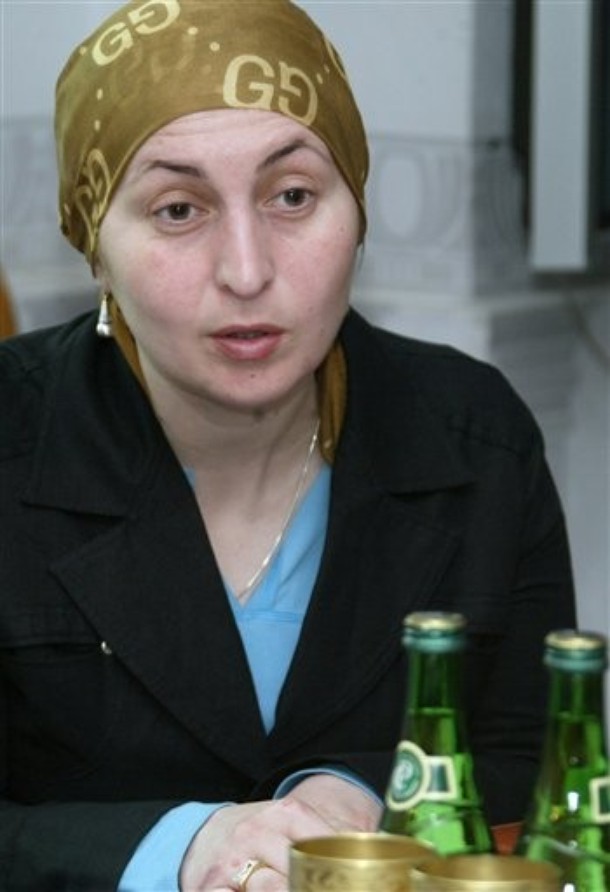
Continued Killings of Rights’ Activists in Chechnya Challenges Moscow
Publication: Eurasia Daily Monitor Volume: 6 Issue: 156
By:

Less than one month after the notorious murder of the Chechen human rights activist Natalya Estemirova, Zarema Sadullaeva and her husband Alik Dzhabrailov were kidnapped and found dead the next day in Grozny. When they initially disappeared on August 10, the Chechen police attempted to downplay the importance of their disappearance (Interfax, August 10, 2009). Sadullaeva and Dzhabrailov worked for the Chechen NGO Spasem Pokolenie (Let’s Save the Generation), and were not known for campaigning to protect human rights. Instead, they focused on helping children and the youth, and the victims of war. Their charity was founded in 2001 and its previous head Murad Muradov was also kidnapped and later his mutilated body was found in Grozny in April 2005 (www.grani.ru, August 11).
Despite the respected human rights organization Memorial suspending its activities in Chechnya in the aftermath of the murder of Natalya Estemirova on July 15, its withdrawal has not stemmed the wave of killings -which has targeted rights activists. The second killing within such a short period evoked an impressive international reaction from all the main human rights organizations, and the U.S., the E.U. and European governments expressed concern over the deteriorating situation in Chechnya. While many observers were inclined to consider Ramzan Kadyrov, the President of Chechnya, as being behind the killings, it is hard to imagine that he orchestrated the latest, essentially self-defeating wave of killings. After the last attack on the human rights activists, Kadyrov again vowed to undertake "exhaustive measures" to solve these crimes (Caucasian Knot, August 11).
The Head of Memorial Oleg Orlov, referring to Kadyrov’s rule in Chechnya, said: "President Medvedev is perhaps content with having a murderer as the head of one of the regions of the Russian Federation" (Caucasian Knot, July 16). Russian human rights defenders demanded that the authorities investigate and solve the killing of their colleagues. Lyudmila Alekseeva, the Head of the Helsinki Rights Group in Moscow stated: "We intend to attract the attention of international organizations to this killing, we will shout to reach the whole world. The murderers know they will escape punishment. During the Soviet era they put us in prisons, but they did not kill us" (Interfax, August 11).
On July 4, days before Natalya Estemirova was murdered Adam Delimkhanov, the First Vice-Prime Minister of Chechnya threatened unspecified human rights defenders on Chechen television. The records of Delimkhanov’s threats in Chechen were leaked on YouTube and subsequently translated:
"There are certain people who call themselves ‘human rights defenders,’ who actually help these militant scum [sic], these criminal-militants, who work for them and do their dirty work, promote their politics,… they carry on various dialogues…, [sic] But, I know the mood among the security services, the society; I know what the simple folk are saying. They are saying that the claims made by these people [human rights workers], and a certain Aushev and others, in other words, what they are saying and doing, their evil deeds are no better than those of the militants hiding out in the forest" (www.peaceinthecaucasus.org, August 11).
While Delimkhanov’s comments were explicit and might directly link him to Estemirova’s death, Akhmed Zakaev, the political exile from the pro-independence Chechen Ichkeria, stated that he was convinced that Kadyrov was not involved in the recent killings. Instead, he suggested that the Russian federal authorities should take full responsibility for them and undertake a proper investigation (Ekho Moskvy radio, August 12).
At least two news sources reported that the kidnapped or arrested Sadullaeva and Dzhabrailov were seen at a Grozny police station. The Chechen police have denied they were involved in the crime (www.ingushetia.org, August 10; Caucasian Knot, August 12). One of the main themes in the official investigation is that someone might have exacted blood vengeance on Dzhabrailov, as he had been known for his involvement in the pro-separatist insurgency in the past (Caucasian Knot, August 12). This contradicts eyewitness reports that the victims were not violently abducted, but rather taken away as if they were being officially questioned (Caucasian Knot, August 10).
Whether Kadyrov was involved in these crimes or his subordinates took the initiative, or even if the Russian security services decided to frame the leader of Chechnya, the ultimate responsibility will still rest with Kadyrov. This is the reverse consequence of building an extremely rigid "power vertical" in a territory such as Chechnya. As Kadyrov controls everything in the republic, every negative event will be blamed on him.
While Moscow is unlikely to replace Kadyrov for killing another human rights activist, there is also a certain limit on how many killings Moscow can endure without stepping up its security presence in the republic and restraining Kadyrov’s presently unlimited power. However, this would require multiple changes in Moscow’s regional policies and perhaps even within the Kremlin itself, as the Russian "power vertical" and its extreme version in Chechnya share many common features and are inspired and constructed largely by the same person -Prime Minister Vladimir Putin. The alternative would be for Russia to follow the Chechen path and ignore the killing of rights activists and any international criticism. Neither of these two options can be ruled out entirely.




